Unit 8 Have you read Treasure Island yet? Section A2 (3a-3c)课件(共37张PPT)
文档属性
| 名称 | Unit 8 Have you read Treasure Island yet? Section A2 (3a-3c)课件(共37张PPT) |
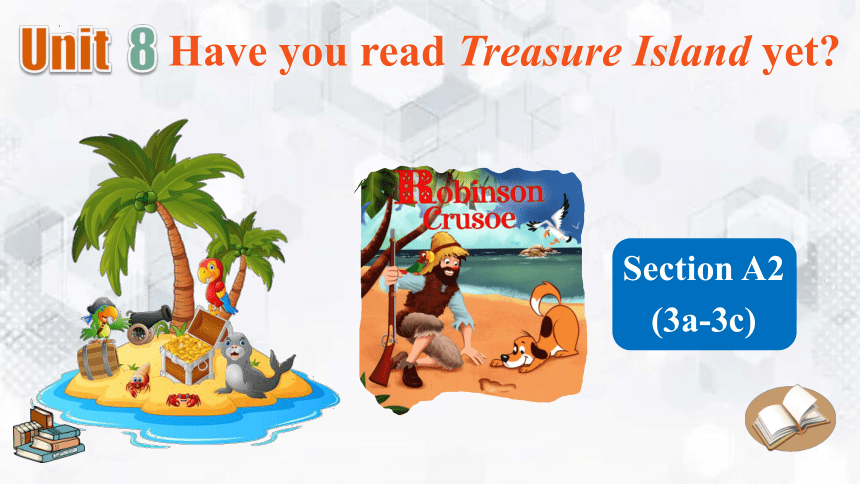
|
|
| 格式 | pptx | ||
| 文件大小 | 12.9MB | ||
| 资源类型 | 教案 | ||
| 版本资源 | 人教新目标(Go for it)版 | ||
| 科目 | 英语 | ||
| 更新时间 | 2024-05-22 00:00:00 | ||
图片预览

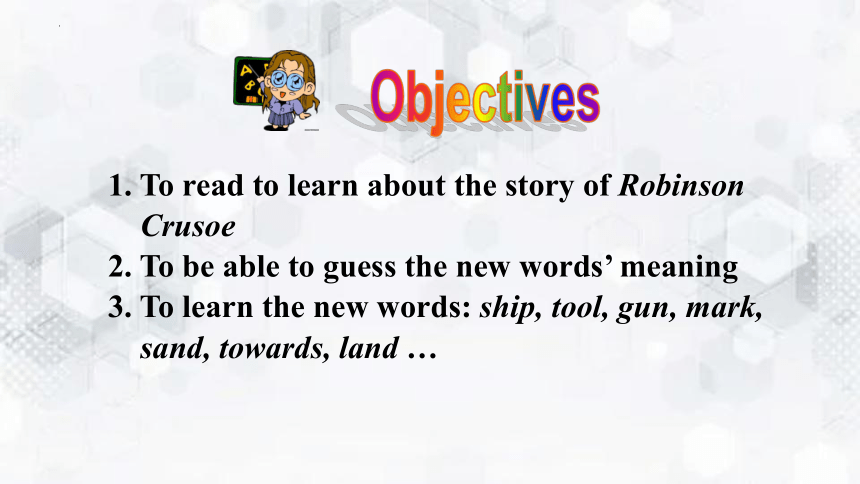
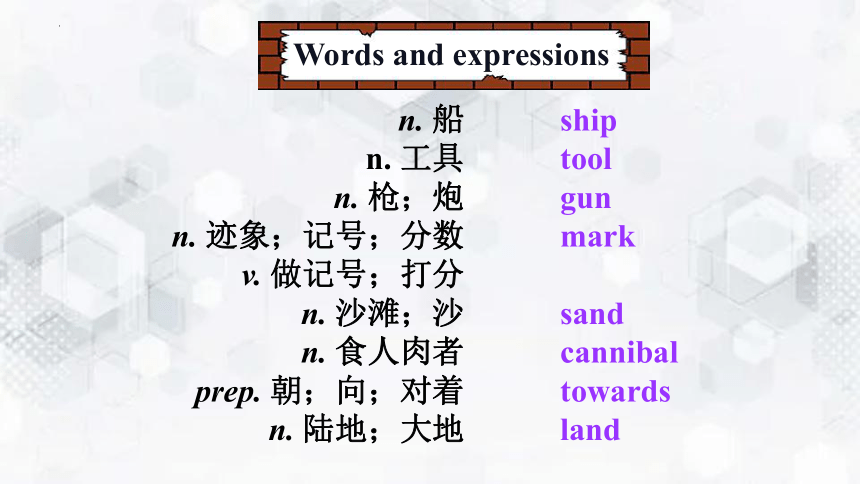
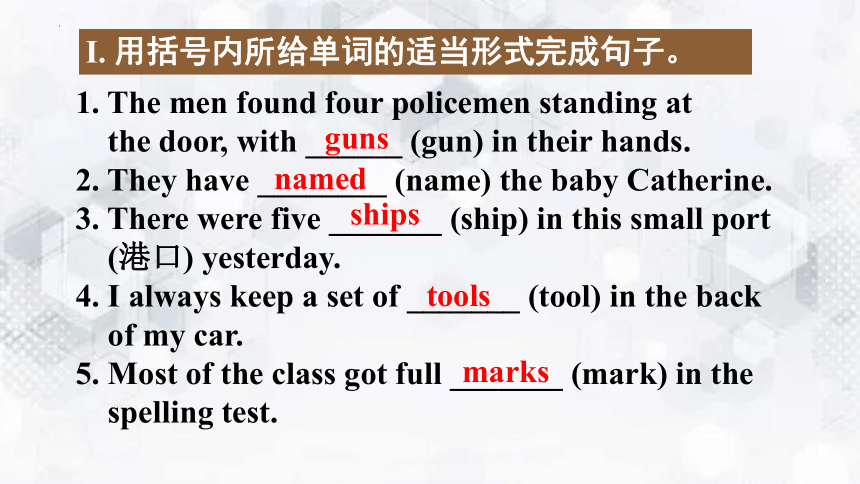
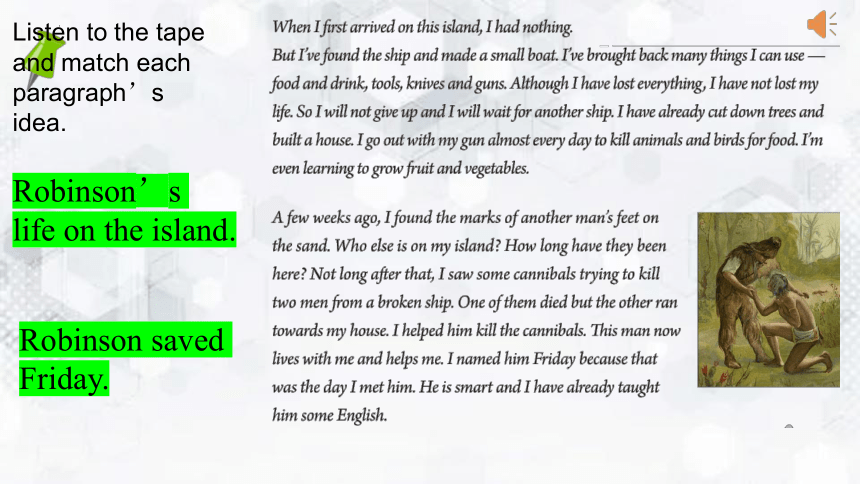
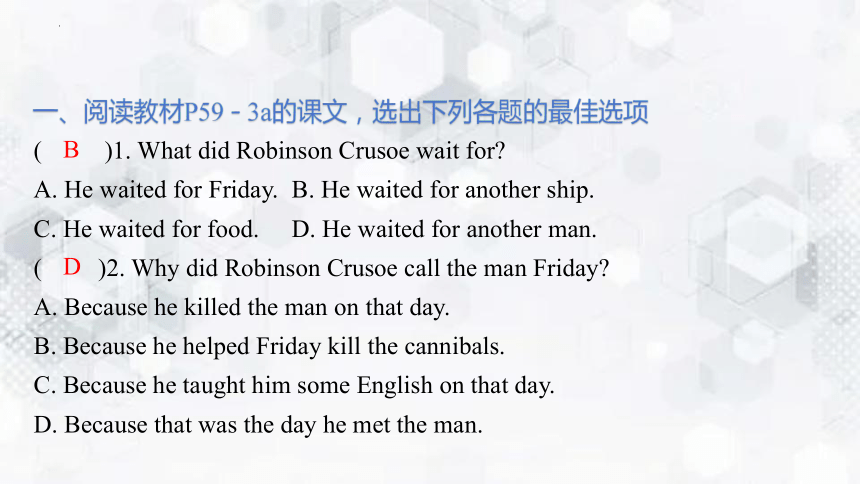
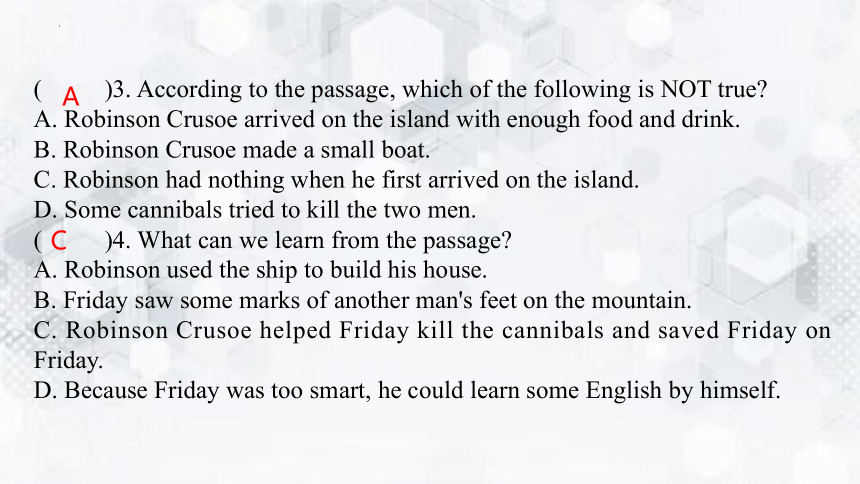
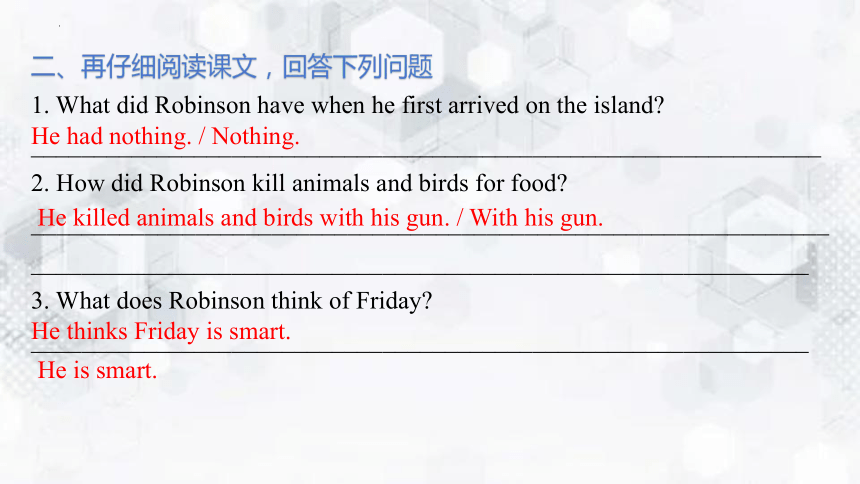
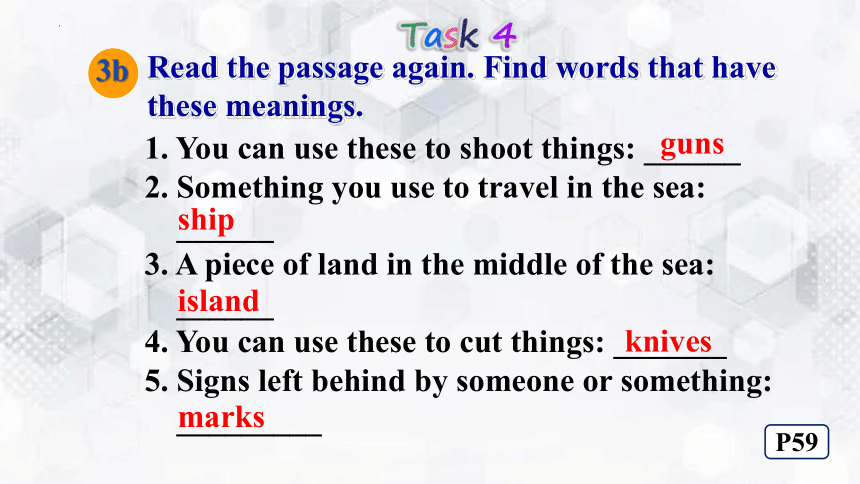
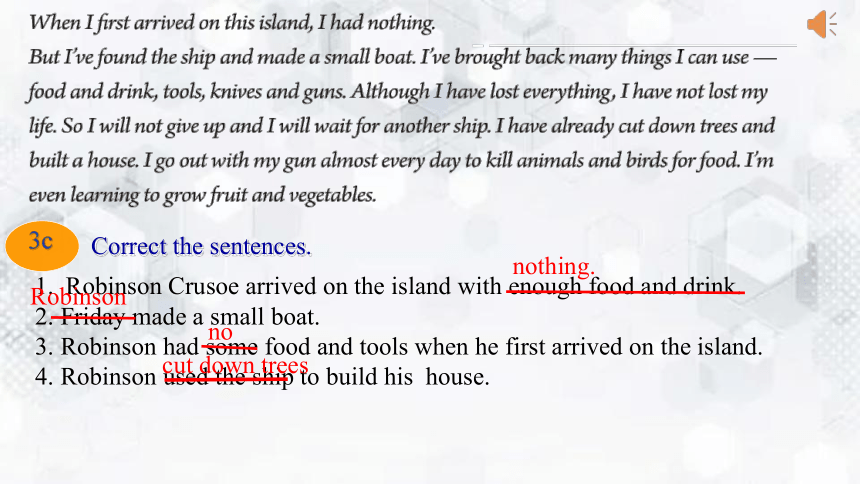
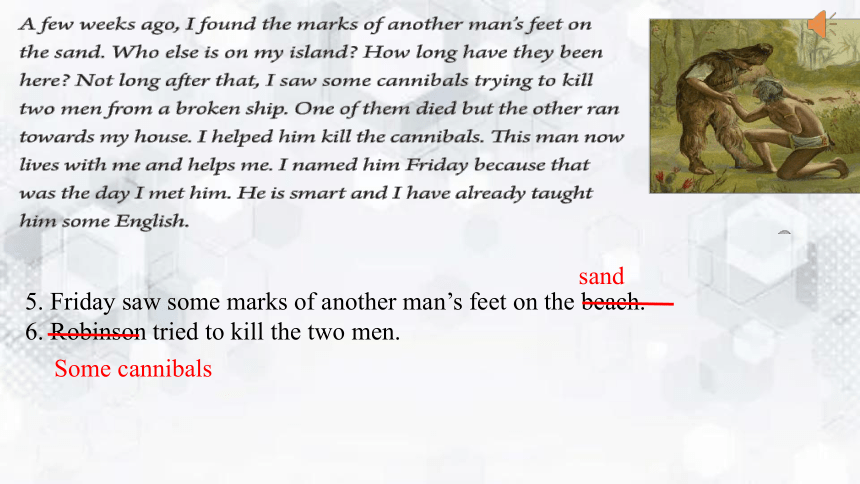
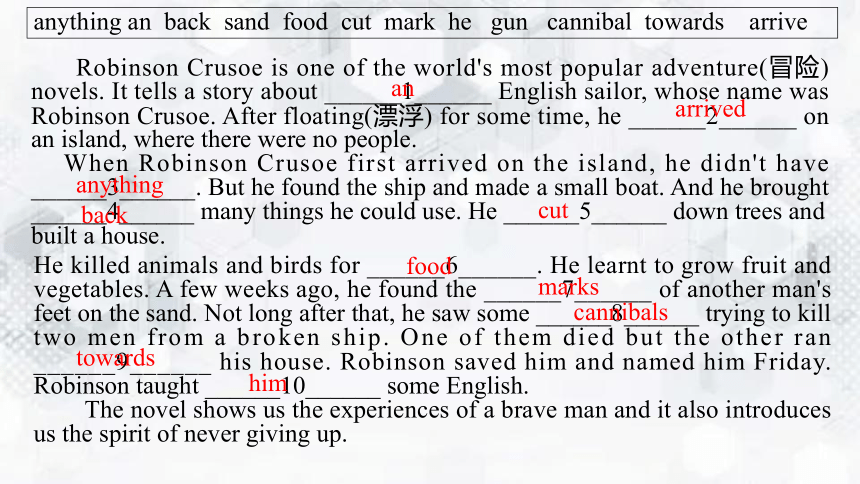
文档简介
(共37张PPT)
Have you read Treasure Island yet
Unit 8
Section A2
(3a-3c)
Objectives
1. To read to learn about the story of Robinson
Crusoe
2. To be able to guess the new words’ meaning
3. To learn the new words: ship, tool, gun, mark,
sand, towards, land …
ship
tool
gun
mark
sand
cannibal
towards
land
n. 船
n. 工具
n. 枪;炮
n. 迹象;记号;分数
v. 做记号;打分
n. 沙滩;沙
n. 食人肉者
prep. 朝;向;对着
n. 陆地;大地
Words and expressions
I. 用括号内所给单词的适当形式完成句子。
1. The men found four policemen standing at
the door, with ______ (gun) in their hands.
2. They have ________ (name) the baby Catherine.
3. There were five _______ (ship) in this small port
(港口) yesterday.
4. I always keep a set of _______ (tool) in the back
of my car.
5. Most of the class got full _______ (mark) in the
spelling test.
guns
named
ships
tools
marks
Listen to the tape and match each paragraph’s idea.
Robinson’s life on the island.
Robinson saved Friday.
一、阅读教材P59-3a的课文,选出下列各题的最佳选项
( )1. What did Robinson Crusoe wait for
A. He waited for Friday. B. He waited for another ship.
C. He waited for food. D. He waited for another man.
( )2. Why did Robinson Crusoe call the man Friday
A. Because he killed the man on that day.
B. Because he helped Friday kill the cannibals.
C. Because he taught him some English on that day.
D. Because that was the day he met the man.
B
D
( )3. According to the passage, which of the following is NOT true
A. Robinson Crusoe arrived on the island with enough food and drink.
B. Robinson Crusoe made a small boat.
C. Robinson had nothing when he first arrived on the island.
D. Some cannibals tried to kill the two men.
( )4. What can we learn from the passage
A. Robinson used the ship to build his house.
B. Friday saw some marks of another man's feet on the mountain.
C. Robinson Crusoe helped Friday kill the cannibals and saved Friday on Friday.
D. Because Friday was too smart, he could learn some English by himself.
A
C
二、再仔细阅读课文,回答下列问题
1. What did Robinson have when he first arrived on the island
_______________________________________________________________
2. How did Robinson kill animals and birds for food
_____________________________________________________________________________________________________________________________
3. What does Robinson think of Friday
______________________________________________________________
He had nothing. / Nothing.
He killed animals and birds with his gun. / With his gun.
He thinks Friday is smart.
He is smart.
Read the passage again. Find words that have these meanings.
You can use these to shoot things: ______
Something you use to travel in the sea:
______
3. A piece of land in the middle of the sea:
______
4. You can use these to cut things: _______
5. Signs left behind by someone or something:
_________
guns
ship
island
knives
marks
3b
Task 4
P59
Robinson Crusoe arrived on the island with enough food and drink.
2. Friday made a small boat.
3. Robinson had some food and tools when he first arrived on the island.
4. Robinson used the ship to build his house.
Correct the sentences.
nothing.
Robinson
no
cut down trees
3c
P59
5. Friday saw some marks of another man’s feet on the beach.
6. Robinson tried to kill the two men.
sand
Some cannibals
He killed animals and birds for ______6______. He learnt to grow fruit and vegetables. A few weeks ago, he found the ______7______ of another man's feet on the sand. Not long after that, he saw some ______8______ trying to kill two men from a broken ship. One of them died but the other ran ______9______ his house. Robinson saved him and named him Friday. Robinson taught ______10______ some English.
The novel shows us the experiences of a brave man and it also introduces us the spirit of never giving up.
Robinson Crusoe is one of the world's most popular adventure(冒险) novels. It tells a story about ______1______ English sailor, whose name was Robinson Crusoe. After floating(漂浮) for some time, he ______2______ on an island, where there were no people.
When Robinson Crusoe first arrived on the island, he didn't have ______3______. But he found the ship and made a small boat. And he brought ______4______ many things he could use. He ______5______ down trees and built a house.
an
arrived
anything
back
cut
anything an back sand food cut mark he gun cannibal towards arrive
food
marks
cannibals
towards
him
Pay attention to the expressions.
到达岛上
一无所有
带回来很多东西
丧生
放弃
等待
砍树
带着枪外出
捕杀动物和鸟作为食物
1. arrive on the island
2. have nothing
3. bring back many things
4. lose one’s life
5. give up
6. wait for
7. cut down trees
8. go out with a gun
9. kill animals and birds for food
Read and translate.
Task 6
学习种水果和蔬菜
几个星期以前
在那之后不久
一个……,(两者中)另一个……
朝……跑去
帮助某人做某事
和……一起住
10. learn to grow fruit
and vegetables
11. a few weeks ago
12. not long after that
13. one ... the other ...
14. run towards ...
15. help sb. (to) do sth.
16. live with sb.
bring – brought – brought
find – found – found
lost – lost – lost
cut – cut – cut
build – built – built
make – made – made
meet – met – met
teach – taught – taught
am/is/are – was/were – been
Task 7 Find out the sentences with the present perfect tense in the passage.
Can you imagine life on a desert island What could you do to save yourself
Task 8
collect rainwater ...
catch fish
make fire
What can we learn from Robinson Crusoe
1. When I first arrived on this island, I had nothing.
当我最初来到这个岛上的时候,我什么都没有。
① By the time I arrived on the scene, it was all over.
我来到现场时,一切都已结束。
② She'll arrive in New York at noon.
她将在正午抵达纽约。
③ It was dark by the time we arrived at the station.
我们到站时,天都已经黑了。
arrive
抵达(某地),不及物动词,后面跟名词要加介词。
2. I’ve brought back many things I can use.
我还带回了很多可以使用的东西。
bring
bring back
① Can you bring me back some milk
你能给我带些牛奶回来吗?
② Astronauts brought back specimens (样本) of
moon rock.
宇航员带回了月球岩石的样本。
(bring – brought – brought)
带回
3. So I will not give up and I will wait for another ship.
所以我不会放弃,我会等另一艘船来。
wait for
① I'm quite happy to wait for you here.
我非常高兴在此等候您。
② When the thieves left the building, the police were
waiting for them.
当盗贼们离开那栋楼的时候,警察正在等着抓他们。
等候;等待
I've given up trying to help her.
我已经放弃努力,不想再帮她了。
give up
(通常因为太难而)终止,放弃
I, they, etc. can't wait/can hardly wait
(我、他们等)迫不及待
① I can't wait to see you.
我迫不及待地想要见你。
② I can hardly wait to see him again.
我迫不及待地想再次见到他。
4. A few weeks ago, I found the marks of another man’s
feet on the sand.
几周前,我在沙滩上发现了另一个人的足迹。
mark
n. 痕迹;污点;记号;分数
① The children left dirty marks all over the kitchen floor.
孩子们把厨房的地板弄得污渍斑斑。
② I've put a mark on the map where I think we should
go for a picnic.
我在地图上作了个记号,标出了我认为我们应该去野
餐的地方。
③ What mark did you get in the biology exam
你生物考试考了多少分?
mark
v. 做记号;打分;标示
① The teacher marked her absent (缺勤的) (= made
a mark by her name to show that she was absent) .
老师在她的名字旁做了个缺课的记号。
② I spend at least six hours a week marking.
我每周至少要花六个小时批改作业。
③ The route has been marked in red.
路线用红色标明了。
He had a way of making his classes enjoyable, so we always got the highest _______ in math in our grade with his teaching.
A. results B. marks C. feeling
5. Who else is on my island
还有谁在我的岛上?
else
① It's not my bag. It must be someone else's.
这不是我的包,肯定是别人的。
② I don't want anything else, thanks.
我不要别的东西了,谢谢。
③ What else did he say
他还说了些什么?
④ The book isn't here. Where else should I look
书不在这儿,我该再到哪儿去看看呢?
(用于以any-,every-,no- 和 some- 开头的词后面,或用于how,what,where,who,why 之后)其他,另外,别的
6. How long have they been here
他们来了多久了?
how long
① — How long have you been studying English
— For about five years.
— 你学英语多久了?
— 大约五年了。
② How long have you been married
你结婚多长时间了?
答语:for + 时间段。
“多久,多长时间”主要对一段时间进行提问,常用于现在完成时。
7. Not long after that, I saw some cannibals trying to kill
two men from a broken ship.
在那以后不久,我看到一些野人想要杀害一条破船上
的两个人。
see sb. doing sth. 看到某人正在做某事
(强调看到的动作正在进行)
see sb. do sth. 看到某人做了某事
(强调看到动作的全过程)
Mary saw him cleaning the classroom.
Mary看见他正在打扫教室。
Mary saw him clean the classroom.
Mary看见他打扫教室了。
8. One of them died but the other ran towards my house.
一个死了,但另一个朝着我的木屋跑过来。
one … the other …
I have two schoolbags. One is red, and the other is blue.
我有两个新书包,一个是红色的,另一个是蓝色的。
一个……,(两者中)另一个……
some ... the others ... 一些……其余的……
the others 指剩下的全部。
The students are doing the cleaning. Some are sweeping the floor, and the others are cleaning the windows.
同学们正在大扫除。一些人在拖地,其余的在擦玻璃。
towards
向,朝;对着
① She stood up and walked towards him.
她站起身来,向他走去。
② She kept glancing (瞥一眼) towards the phone.
她不停地朝电话机那儿瞅。
③ She had her back towards me.
她背对着我。
9. I named him Friday because that was the day I met
him.
我叫他星期五,因为那是我遇到他的日子。
name v. 命名;给……取名
name + sb. + 名字
① They named their son John.
他们给儿子起了个名字叫John。
② We named our dogs Shandy and Belle.
我们给狗分别取名为Shandy和Belle。
给某人取名为……
10. Signs left behind by someone or something
某人或某物留下的标志
leave behind
留下,丢下,撇下,落下
① He wasn't well, so we had to leave him behind.
他身体不适,因此我们只好把他留下。
② We left in a hurry and I must have left my keys
behind.
我们走得太匆忙,我肯定是忘了拿钥匙。
③ Don't leave any of your belongings (随身物品) behind.
别忘了带上自己的随身物品。
注: 另附word文档,
点此链接
II. 根据汉语意思完成句子,每空一词。
爸爸从农场带回许多东西。
2. 我没有其他事情可做了。
3. 尽管我一无所有了,但至少我还活着。
4. 他们来这儿多长时间了?
5. 我叫他星期五,因为那是我遇到他的日子。
I ______ him Friday because that was the day I ____ him.
I have _________ _______ to do.
______ _______ have they been here
________ I have lost everything, I have not ____ ___ ____.
Dad has ________ ______ many things from the farm.
brought back
nothing else
Although
lost my life
How long
named
met
III. 在空格处填入一个适当的单词或用括号中词语的
正确形式填空。
Little Women is written by Louisa May Alcott. The book 1._________(follow) the life of four sisters—Meg, Jo, Beth and Amy. The sisters live with their mother. Their father 2._________ (be) in the army for many years and he is far away from them. Meg is the oldest of the four sisters. She loves pretty clothes. Jo doesn’t care about dresses 3._______ hairstyles (发型). She is a tomboy (假小子). Beth is shy and quiet. The 4.________ (young), Amy, loves beautiful things and she thinks she is 5._______ important person.
follows
has been
or
youngest
an
It was Christmas Day, and the sisters were unhappy, because they 6.___________(not have) any gifts. Their mother said that they mustn’t spend money 7.________ useless things. There was a war and everybody should
8._________(help). The girls 9._________(hear) from their father. He told them to work hard and not to lose hope. The girls decided 10.________ (try) their best to improve themselves and stay cheerful.
didn’t have
on
help
heard
to try
Have you read Treasure Island yet
Unit 8
Section A2
(3a-3c)
Objectives
1. To read to learn about the story of Robinson
Crusoe
2. To be able to guess the new words’ meaning
3. To learn the new words: ship, tool, gun, mark,
sand, towards, land …
ship
tool
gun
mark
sand
cannibal
towards
land
n. 船
n. 工具
n. 枪;炮
n. 迹象;记号;分数
v. 做记号;打分
n. 沙滩;沙
n. 食人肉者
prep. 朝;向;对着
n. 陆地;大地
Words and expressions
I. 用括号内所给单词的适当形式完成句子。
1. The men found four policemen standing at
the door, with ______ (gun) in their hands.
2. They have ________ (name) the baby Catherine.
3. There were five _______ (ship) in this small port
(港口) yesterday.
4. I always keep a set of _______ (tool) in the back
of my car.
5. Most of the class got full _______ (mark) in the
spelling test.
guns
named
ships
tools
marks
Listen to the tape and match each paragraph’s idea.
Robinson’s life on the island.
Robinson saved Friday.
一、阅读教材P59-3a的课文,选出下列各题的最佳选项
( )1. What did Robinson Crusoe wait for
A. He waited for Friday. B. He waited for another ship.
C. He waited for food. D. He waited for another man.
( )2. Why did Robinson Crusoe call the man Friday
A. Because he killed the man on that day.
B. Because he helped Friday kill the cannibals.
C. Because he taught him some English on that day.
D. Because that was the day he met the man.
B
D
( )3. According to the passage, which of the following is NOT true
A. Robinson Crusoe arrived on the island with enough food and drink.
B. Robinson Crusoe made a small boat.
C. Robinson had nothing when he first arrived on the island.
D. Some cannibals tried to kill the two men.
( )4. What can we learn from the passage
A. Robinson used the ship to build his house.
B. Friday saw some marks of another man's feet on the mountain.
C. Robinson Crusoe helped Friday kill the cannibals and saved Friday on Friday.
D. Because Friday was too smart, he could learn some English by himself.
A
C
二、再仔细阅读课文,回答下列问题
1. What did Robinson have when he first arrived on the island
_______________________________________________________________
2. How did Robinson kill animals and birds for food
_____________________________________________________________________________________________________________________________
3. What does Robinson think of Friday
______________________________________________________________
He had nothing. / Nothing.
He killed animals and birds with his gun. / With his gun.
He thinks Friday is smart.
He is smart.
Read the passage again. Find words that have these meanings.
You can use these to shoot things: ______
Something you use to travel in the sea:
______
3. A piece of land in the middle of the sea:
______
4. You can use these to cut things: _______
5. Signs left behind by someone or something:
_________
guns
ship
island
knives
marks
3b
Task 4
P59
Robinson Crusoe arrived on the island with enough food and drink.
2. Friday made a small boat.
3. Robinson had some food and tools when he first arrived on the island.
4. Robinson used the ship to build his house.
Correct the sentences.
nothing.
Robinson
no
cut down trees
3c
P59
5. Friday saw some marks of another man’s feet on the beach.
6. Robinson tried to kill the two men.
sand
Some cannibals
He killed animals and birds for ______6______. He learnt to grow fruit and vegetables. A few weeks ago, he found the ______7______ of another man's feet on the sand. Not long after that, he saw some ______8______ trying to kill two men from a broken ship. One of them died but the other ran ______9______ his house. Robinson saved him and named him Friday. Robinson taught ______10______ some English.
The novel shows us the experiences of a brave man and it also introduces us the spirit of never giving up.
Robinson Crusoe is one of the world's most popular adventure(冒险) novels. It tells a story about ______1______ English sailor, whose name was Robinson Crusoe. After floating(漂浮) for some time, he ______2______ on an island, where there were no people.
When Robinson Crusoe first arrived on the island, he didn't have ______3______. But he found the ship and made a small boat. And he brought ______4______ many things he could use. He ______5______ down trees and built a house.
an
arrived
anything
back
cut
anything an back sand food cut mark he gun cannibal towards arrive
food
marks
cannibals
towards
him
Pay attention to the expressions.
到达岛上
一无所有
带回来很多东西
丧生
放弃
等待
砍树
带着枪外出
捕杀动物和鸟作为食物
1. arrive on the island
2. have nothing
3. bring back many things
4. lose one’s life
5. give up
6. wait for
7. cut down trees
8. go out with a gun
9. kill animals and birds for food
Read and translate.
Task 6
学习种水果和蔬菜
几个星期以前
在那之后不久
一个……,(两者中)另一个……
朝……跑去
帮助某人做某事
和……一起住
10. learn to grow fruit
and vegetables
11. a few weeks ago
12. not long after that
13. one ... the other ...
14. run towards ...
15. help sb. (to) do sth.
16. live with sb.
bring – brought – brought
find – found – found
lost – lost – lost
cut – cut – cut
build – built – built
make – made – made
meet – met – met
teach – taught – taught
am/is/are – was/were – been
Task 7 Find out the sentences with the present perfect tense in the passage.
Can you imagine life on a desert island What could you do to save yourself
Task 8
collect rainwater ...
catch fish
make fire
What can we learn from Robinson Crusoe
1. When I first arrived on this island, I had nothing.
当我最初来到这个岛上的时候,我什么都没有。
① By the time I arrived on the scene, it was all over.
我来到现场时,一切都已结束。
② She'll arrive in New York at noon.
她将在正午抵达纽约。
③ It was dark by the time we arrived at the station.
我们到站时,天都已经黑了。
arrive
抵达(某地),不及物动词,后面跟名词要加介词。
2. I’ve brought back many things I can use.
我还带回了很多可以使用的东西。
bring
bring back
① Can you bring me back some milk
你能给我带些牛奶回来吗?
② Astronauts brought back specimens (样本) of
moon rock.
宇航员带回了月球岩石的样本。
(bring – brought – brought)
带回
3. So I will not give up and I will wait for another ship.
所以我不会放弃,我会等另一艘船来。
wait for
① I'm quite happy to wait for you here.
我非常高兴在此等候您。
② When the thieves left the building, the police were
waiting for them.
当盗贼们离开那栋楼的时候,警察正在等着抓他们。
等候;等待
I've given up trying to help her.
我已经放弃努力,不想再帮她了。
give up
(通常因为太难而)终止,放弃
I, they, etc. can't wait/can hardly wait
(我、他们等)迫不及待
① I can't wait to see you.
我迫不及待地想要见你。
② I can hardly wait to see him again.
我迫不及待地想再次见到他。
4. A few weeks ago, I found the marks of another man’s
feet on the sand.
几周前,我在沙滩上发现了另一个人的足迹。
mark
n. 痕迹;污点;记号;分数
① The children left dirty marks all over the kitchen floor.
孩子们把厨房的地板弄得污渍斑斑。
② I've put a mark on the map where I think we should
go for a picnic.
我在地图上作了个记号,标出了我认为我们应该去野
餐的地方。
③ What mark did you get in the biology exam
你生物考试考了多少分?
mark
v. 做记号;打分;标示
① The teacher marked her absent (缺勤的) (= made
a mark by her name to show that she was absent) .
老师在她的名字旁做了个缺课的记号。
② I spend at least six hours a week marking.
我每周至少要花六个小时批改作业。
③ The route has been marked in red.
路线用红色标明了。
He had a way of making his classes enjoyable, so we always got the highest _______ in math in our grade with his teaching.
A. results B. marks C. feeling
5. Who else is on my island
还有谁在我的岛上?
else
① It's not my bag. It must be someone else's.
这不是我的包,肯定是别人的。
② I don't want anything else, thanks.
我不要别的东西了,谢谢。
③ What else did he say
他还说了些什么?
④ The book isn't here. Where else should I look
书不在这儿,我该再到哪儿去看看呢?
(用于以any-,every-,no- 和 some- 开头的词后面,或用于how,what,where,who,why 之后)其他,另外,别的
6. How long have they been here
他们来了多久了?
how long
① — How long have you been studying English
— For about five years.
— 你学英语多久了?
— 大约五年了。
② How long have you been married
你结婚多长时间了?
答语:for + 时间段。
“多久,多长时间”主要对一段时间进行提问,常用于现在完成时。
7. Not long after that, I saw some cannibals trying to kill
two men from a broken ship.
在那以后不久,我看到一些野人想要杀害一条破船上
的两个人。
see sb. doing sth. 看到某人正在做某事
(强调看到的动作正在进行)
see sb. do sth. 看到某人做了某事
(强调看到动作的全过程)
Mary saw him cleaning the classroom.
Mary看见他正在打扫教室。
Mary saw him clean the classroom.
Mary看见他打扫教室了。
8. One of them died but the other ran towards my house.
一个死了,但另一个朝着我的木屋跑过来。
one … the other …
I have two schoolbags. One is red, and the other is blue.
我有两个新书包,一个是红色的,另一个是蓝色的。
一个……,(两者中)另一个……
some ... the others ... 一些……其余的……
the others 指剩下的全部。
The students are doing the cleaning. Some are sweeping the floor, and the others are cleaning the windows.
同学们正在大扫除。一些人在拖地,其余的在擦玻璃。
towards
向,朝;对着
① She stood up and walked towards him.
她站起身来,向他走去。
② She kept glancing (瞥一眼) towards the phone.
她不停地朝电话机那儿瞅。
③ She had her back towards me.
她背对着我。
9. I named him Friday because that was the day I met
him.
我叫他星期五,因为那是我遇到他的日子。
name v. 命名;给……取名
name + sb. + 名字
① They named their son John.
他们给儿子起了个名字叫John。
② We named our dogs Shandy and Belle.
我们给狗分别取名为Shandy和Belle。
给某人取名为……
10. Signs left behind by someone or something
某人或某物留下的标志
leave behind
留下,丢下,撇下,落下
① He wasn't well, so we had to leave him behind.
他身体不适,因此我们只好把他留下。
② We left in a hurry and I must have left my keys
behind.
我们走得太匆忙,我肯定是忘了拿钥匙。
③ Don't leave any of your belongings (随身物品) behind.
别忘了带上自己的随身物品。
注: 另附word文档,
点此链接
II. 根据汉语意思完成句子,每空一词。
爸爸从农场带回许多东西。
2. 我没有其他事情可做了。
3. 尽管我一无所有了,但至少我还活着。
4. 他们来这儿多长时间了?
5. 我叫他星期五,因为那是我遇到他的日子。
I ______ him Friday because that was the day I ____ him.
I have _________ _______ to do.
______ _______ have they been here
________ I have lost everything, I have not ____ ___ ____.
Dad has ________ ______ many things from the farm.
brought back
nothing else
Although
lost my life
How long
named
met
III. 在空格处填入一个适当的单词或用括号中词语的
正确形式填空。
Little Women is written by Louisa May Alcott. The book 1._________(follow) the life of four sisters—Meg, Jo, Beth and Amy. The sisters live with their mother. Their father 2._________ (be) in the army for many years and he is far away from them. Meg is the oldest of the four sisters. She loves pretty clothes. Jo doesn’t care about dresses 3._______ hairstyles (发型). She is a tomboy (假小子). Beth is shy and quiet. The 4.________ (young), Amy, loves beautiful things and she thinks she is 5._______ important person.
follows
has been
or
youngest
an
It was Christmas Day, and the sisters were unhappy, because they 6.___________(not have) any gifts. Their mother said that they mustn’t spend money 7.________ useless things. There was a war and everybody should
8._________(help). The girls 9._________(hear) from their father. He told them to work hard and not to lose hope. The girls decided 10.________ (try) their best to improve themselves and stay cheerful.
didn’t have
on
help
heard
to try
同课章节目录
- Unit 1 What's the matter?
- Section A
- Section B
- Unit 2 I'll help to clean up the city parks.
- Section A
- Section B
- Unit 3 Could you please clean your room?
- Section A
- Section B
- Unit 4 Why don't you talk to your parents?
- Section A
- Section B
- Unit 5 What were you doing when the rainstorm came
- Section A
- Section B
- Review of Units 1-5
- Unit 6 An old man tried to move the mountains.
- Section A
- Section B
- Unit 7 What's the highest mountain in the world?
- Section A
- Section B
- Unit 8 Have you read Treasure Island yet?
- Section A
- Section B
- Unit 9 Have you ever been to a museum?
- Section A
- Section B
- Unit 10 I've had this bike for three years.
- Section A
- Section B
